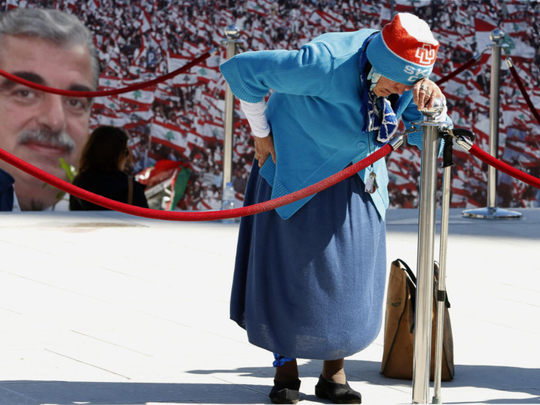
Beirut: A decade after his assassination on February 14, 2005, many Lebanese are still debating what prime minister Rafik Hariri’s legacy is, while acknowledging that he made his mark in contemporary history and stood out among a sea of challenged politicians who talked the talk but failed to walk the walk. What almost everyone agrees to is the fact that the universally acknowledged successes, which defined Hariri, were what his foes could not and did not tolerate.
A paternalistic tycoon who made his fortune in Saudi Arabia where he forged impeccably close ties with senior Al Saud ruling family members, Rafik Hariri was a born nationalist, someone who looked at his country as worth preserving — not exploiting. What was truly remarkable was the level of tolerance he brought to the table at a time when few were interested in compromise. In fact, Hariri — who was a strong believer — accepted that Lebanon must remain a politically secular country, while it rightfully took pride in the religious freedoms that allowed Christians and Muslims from all denominations to practice their faith as they wished without state interference.
Towards that end, he became the first Lebanese leader who defined what the interests of the “nation” ought to be — to ensure liberty for all, disengage from regional conflicts, and trump sect and clan to ensure prosperity for all.
He did not want Christians to think of a division of the country or Muslims to fantasise of an Islamic state. He worked to promote amity among Sunnis and Shiites, end the hatred that came with the occupations and the enslavements imposed by foreign powers, precisely to allow most to succeed at home instead of migrating overseas in search of prosperity. Hariri wanted Lebanon to truly become like Switzerland or Austria, two countries known not because of their military might — though he recognised that Beirut needed to protect itself from Israel — but for their human capital.
He wished that everyone would love their land and take pride in it. Above all else, he worked to create a new political class that did not simply see Lebanon as a playground to abuse, but to introduce beliefs that centered on service. Hariri wanted everyone to throw away their guns and pick up a shovel, drive a truck, pick up a pen or, quite simply, become productive. He aimed to instil the love of moderation among a people who were easily swayed by extremists.
Ten years after his assassination, Lebanon has ground to a near halt, as sectarian fault lines rekindled with a vengeance. Without a political solution as to what the country ought to be — with Hezbollah working towards the imposition of the velayet-e faqih [the Iranian style Jurisprudence of God] — the Lebanese were once again confronted by existential dilemmas. Few heeded his counsel though his words echoed loud and clear and where he alive, observers believed, he would have worked towards a full-scale a neutrality policy, just as he engineered a post-civil war recovery.
Instead, and through the intricacies of national salvation governments after 2005, the Lebanese accomplished the opposite. In 2015, Beirut was locked in a permanent political stalemate, without a head of state and a government held hostage to party vetoes. Unlike Hariri who protected Lebanon from regional turmoil, wily politicians volunteered to fight next door after 2011, allegedly because such decisions protected the country. Moreover, as the Syrian civil war spilled over into Lebanon, the gap that separated Sunnis from Shiites was further enlarged, something that Hariri abhorred.
Lebanese citizens from all segments of society and from every religious denomination believed that Hariri would have prevented such entanglements because he at least always placed the interests of Lebanon above all else. Many lamented how Hariri’s murder denied Lebanon of a principled politician who seldom wavered from his core beliefs even if he accommodated a powerful neighbour.
After February 14, 2005, and for a remarkably short period of time when the Lebanese ushered in their “Cedar Revolution,” awakened citizens held on to the hope that a true civil society was about to emerge, one that would impose order in the political establishment. That project failed as savvy but unprincipled officials neglected the natural lessons that the assassination presented.
Instead, a challenged political class embarked on regional adventures, froze the constitution, toyed with parliament, absconded the government, and otherwise trampled on the legacy that Rafik Hariri bequeathed to his nation. Some preferred polarisation to prosperity, subservience to freedom, and fresh tutelage to liberty while others fought to honour the memory of a founding father.












